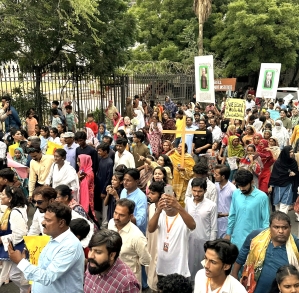
Adil Najam, Dean Emeritus and Professor at Boston University’s Pardee School of Global Studies, recently spoke to The News on Sunday, one of Pakistan’s leading English-language newspapers, offering a critical take on the country’s education challenges. His interview, given on World Literacy Day, shines a light on the alarming state of education and the societal indifference that, according to him, perpetuates it.
Najam questioned the accuracy of official literacy statistics in Pakistan, stating,
“Frankly, I don’t believe [all of] the numbers. Technically, we are told, Pakistan’s overall literacy rate is in the 60s [percent]. Among young people, it may be as high as 70 percent or even 80 percent. I do not believe that.” He emphasized that the real issue extends beyond numbers to what basic literacy truly means in practical terms.
Throughout the interview, Najam highlighted the concerning statistic of 25 million children out of school in Pakistan, the second-highest number globally after Nigeria. He argued that this represents a societal choice to keep a significant portion of the population illiterate, despite constitutional provisions mandating universal education for children aged 5 to 16.
A key theme in Najam’s analysis was the lack of societal anger over the state of education in Pakistan as he posed the question,
“Why aren’t we outraged?” emphasizing that the absence of popular demand for better education is a serious criticism of Pakistani society as a whole. Najam argued that without genuine demand from the people, policy changes alone cannot solve the education crisis.
Najam emphasized the connection between literacy and broader societal values, stating, “Literacy has almost no influence on who we value, respect or reward. When you see that in a society, the numbers shouldn’t come as a surprise.” This observation highlights the need for a cultural shift in how education is perceived and valued in Pakistan.
In his commentary, Najam also explored the role of policy in addressing the literacy and education challenges in Pakistan. While acknowledging the importance of government policy, he emphasized that policy operates within a societal context. He argued,
Najam drew attention to the constitutional provision mandating universal education for all children aged 5 to 16. He questioned why this provision remains unenforced, challenging the selective focus on constitutional debates while ignoring this critical educational mandate. This point highlights the gap between legal frameworks and practical implementation in Pakistan’s education sector.
The interview serves as a call to action for those interested in development and social justice, challenging readers to consider the role of societal values and priorities in shaping educational outcomes. It emphasizes the need for a comprehensive approach to education reform that addresses deeper cultural attitudes towards learning and literacy.
Najam’s perspectives offer a valuable view on the challenges facing education in developing nations. His critique invites reflection on how societal attitudes and priorities can be shifted to foster a culture that truly values education and literacy, both in academic studies and in practical development work.



